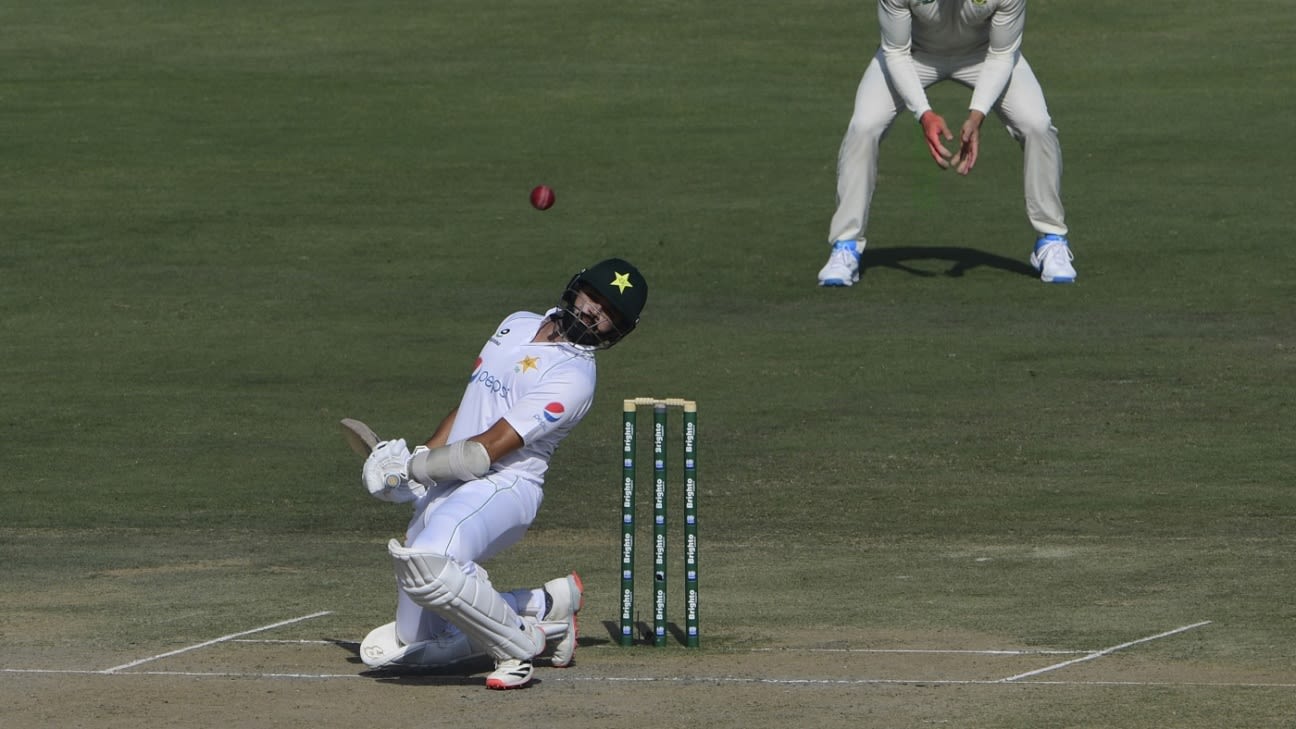
Tea Pakistan 178 for 6 (Fawad 63*,Faheem 0*, Rabada 2-27, Maharaj 2-43) trail South Africa 220 by 42 runs
Two sessions in on a day that might as well have been slipped a sedative for how much calmer it's been compared to yesterday, Pakistan demonstrated that if the bowling isn't at near superhuman level and the batsman aren't desperate to gift their wickets away, the Karachi pitch doesn't quite hold that many demons after all. As the ball got older and the batsman more confident, Pakistan continued to knock down the South African first innings total of 220, taking tea just 42 runs behind with four wickets still in hand.
Fawad Alam's unbeaten innings of 63 forms the spine of Pakistan's resistance, not entirely unexpected since this is the ground that has seen the 35-year old score the bulk of those record-breaking first-class runs that never quite seemed to please the national selectors enough. His experience in Karachi shone through especially in the way he handled the spin of Keshav Maharaj, who threatened most consistently through the session and was responsible for breaking the seemingly impregnable partnership between Alam and Azhar Ali.
The wicket came when the stand stood at 91 in the best part of 40 overs, just after Azhar brought up his half-century. He found himself reaching for a ball that didn't need to be engaged with, getting a feather through to de Kock's gloves. It was a steely innings, but in a game where no batsman seems to be able to convert a decent score into a match-dominating one, Azhar's innings would only go on to extend that theme.
It might have been a soft dismissal, but there was nothing soft about the manner in which Pakistan dealt with a situation that could have unravelled fairly speedily. Mohammad Rizwan averages 55 at this ground over the last five years, and alongside Alam, he quickly picked up where Azhar had left off. The pace bowlers, especially Anrich Nortje, were beginning to find reverse swing as the ball aged, meaning batting was never as straightforward as it had been in the morning session. But Rizwan refused to get bogged down in the face of the quicks, flicking Nortje through midwicket when his line wavered and taking the attack to Lungi Ngidi - the least penetrative of the South African bowlers - as soon as he was introduced, forcing de Kock to turn back to his somewhat overbowled primary options earlier than he'd planned.
That adventurousness, however, did come at a price. Rizwan would begin the last over before tea by crunching Ngidi to extra cover again, but when he poked tentatively at one outside off two balls later, he would find an edge that carried to slips, bringing the curtain down on a counterattacking innings, and giving the middle session a slightly different complexion than it had been set to take.
Following the frenzy of last evening, Pakistan were clear in their minds this morning about the task that lay ahead and set about it in the first session with the sort of calm that had been so distinctly absent in the dying stages of day one. There wasn't as much variable bounce for either Kagiso Rabada or Anrich Nortje to exploit, and once a couple of early jitters were seen off, the home batsmen's comfort and confidence at the crease began to grow. A loose over from Nortje saw Pakistan take ten runs that brought up their fifty, and from there on, the task of accumulation and survival became somewhat more straightforward.
There was never any panic even when the runs dried up, and once the spinners were introduced, the pair of Ali and Alam appeared to have a more assured plan of handling them than their South African counterparts had been 24 hours earlier. There were no low-percentage attacking shots, and they played both Keshav Maharaj and George Linde on merit rather than on preconceived notions of the tricks the pitch would play with those deliveries.
Maharaj was the bowler who continued to look most likely to break through, responsible for giving both batsmen a somewhat uncomfortable moment each this morning. Ali was a little fortuitous to survive an lbw shout on the technicality that there was no way of knowing whether it struck bat or pad first, while an edge from Alam just missed Dean Elgar's hands at first slip.
He would end up with a wicket he might have felt he deserved for his efforts in the second session, but with Pakistan closing in on South Africa's first innings total, his side will need more from their most experienced spinner while this game remains as finely poised as it is right now.
Danyal Rasool is a sub-editor at ESPNcricinfo. @Danny61000















 Phone: (800) 737. 6040
Phone: (800) 737. 6040 Fax: (800) 825 5558
Fax: (800) 825 5558 Website:
Website:  Email:
Email: 






